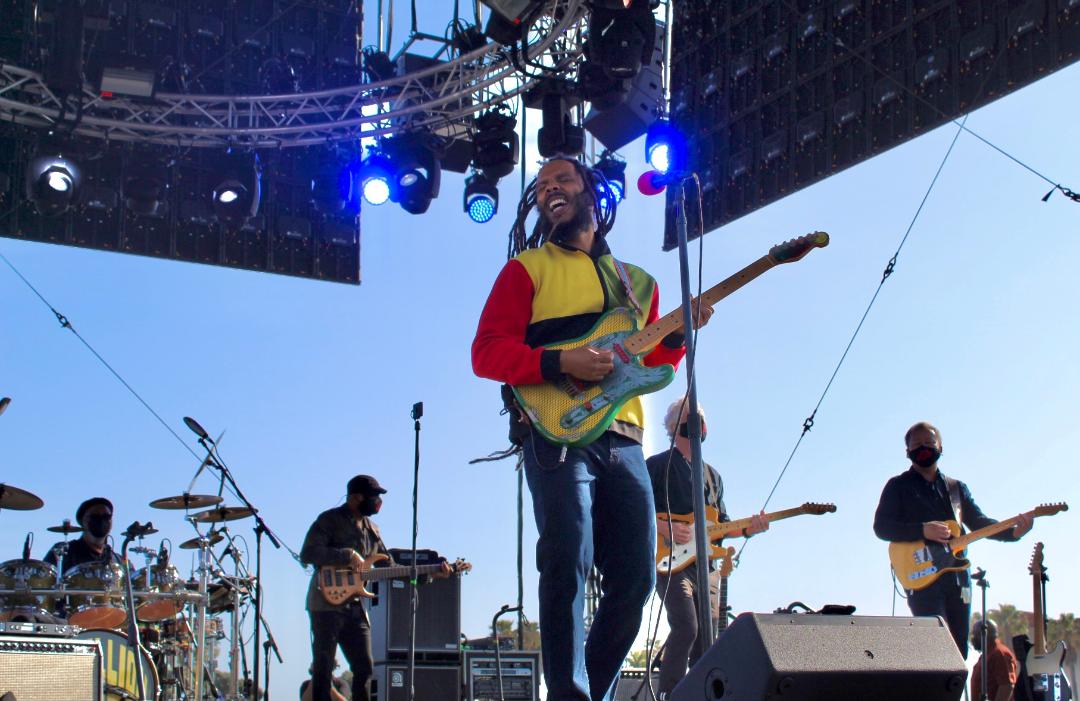
Photo credit: Kirstin BonningThe ongoing global pandemic so far has delayed some of Ziggy Marley’s plans to pay tribute to his father, Bob Marley, as part of a year-long celebration honoring the late reggae legend’s 75th birthday. Last year, Ziggy postponed a highly-anticipated summer schedule with his brother, Stephen. Instead, like the most of the world’s musicians, Ziggy went home, working on various projects, including a new album of children’s songs, safely away from the stage.When the multi-Grammy winner announced that his first live, in-person concert for 2021 would be a tribute to Bob at the Ventura County Fairgrounds, it fueled speculation that Ziggy would be reigniting the full tour, as well. And, if the two-show Saturday evening appearance in the packed Fairgrounds parking lot was a suggestion of things to come, it is going to be spectacular. Ziggy’s first winning move was the set, itself. Choosing to re-create a full Bob performance, in sequence, was inspired. Ziggy picked an April 5, 1979 show from Tokyo, and its songlist loaded with Bob classics that smartly avoided the formula of a “greatest hits” run-through. Conspicuously outfitted in a track jacket of red, gold, black, and green, Marley said little by way of introduction before kicking off the 15-song barrage with “Positive Vibration.” With a slight ocean breeze at his back, and endless blue sky above, Ziggy and his nine-piece ensemble attacked the show as though it was their own.Marley hinted the show was from Japan in 1979, but gave away nothing else as the band rolled through early Bob nuggets, “Concrete Jungle” and “Them Belly Full (But We Hungry).” On “Burnin’ and Lootin’,” guitarists Takeshi Akimoto and Adam Zimmon traded complementing lines akin to vintage Wailer players, Al Anderson and Junior Marvin, against the spotless timekeeping of drummer Santa Davis. Ziggy was as much energized as he was possessed by each moment, often a hand to the face, repeating lyrics with a reverent cadence of incantation. He strove for deeper connections, ones that imbued the stretch of classics filling the second half with greater import than mere familiar songs. It felt intimate, spiritual. Whether “I Shot the Sherriff” or “No Woman, No Cry,”- the latter with Zimmon nailing Anderson’s indelible solo- or as they danced their way to the finale with echoes of Bob’s quest for civil and social justice on “War,” “Get Up, Stand Up,” and the “Exodus” closer, Ziggy and his band were locked-in tight and quietly intense. There was no encore. Ziggy slipped away into a waiting SUV, then shuttled to a Fairgrounds dressing room. He would return an hour later, to reprise the entire performance for an evening audience. Consciously special and finely executed, here’s hoping it was just the first of many Bob Marley tributes to come from Ziggy this year.
